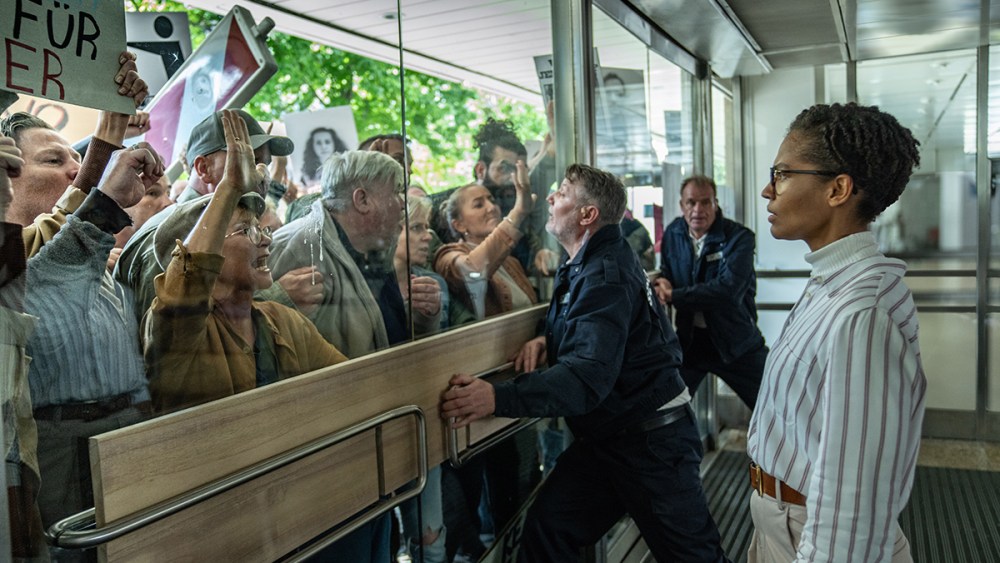
Can you imagine a world without prisons? In eight-episode series “A Better Place,” bowing at Mipcom, one city decides to do just that, closing down its correctional facilities and reintegrating prisoners into the society. Some support the idea – others are petrified.
“If you ask me, it’s a perfect moment to talk about this topic. The world is becoming more and more polarized, more and more black and white. We want to make people think and this series really takes time to examine the consequences of such experience,” says Nicolas Loock, managing director of Studiocanal TV and Studiocanal Series.
“We need to be able to forgive. Otherwise, what’s left? It’s supposed to be entertaining, but it would be great to launch a discussion as well, because there are similar experiments under way. Different countries look for other ways to rehabilitate people.”
A German-language series, “A Better Place” was produced by Komplizen Serien, Studiocanal Series, WDR, ARD Degeto, Canal+ France and Canal+ Austria. It was created by Alexander Lindh, who also serves as a showrunner, and Laurent Mercier. Anne Zohra Berrached and Konstantin Bock direct.
Popular on Variety
“I guess [the concept] could be viewed as problematic only if we would give just one answer. That’s not the case. We wanted to bring nuance and subtlety to this ongoing debate. Our system is broken and we have to think about other solutions,” adds Chloe Marquet, head of international sales for films and TV Series at Studiocanal.
“There’s this sentence in the first episode that really struck me. They say that if you look at the U.S., for example, you have the death penalty and yet crime rates are soaring. It just proves it’s not working. Now, during the presidential election, we’ll have some interesting conversations about it, for sure.”
In the show, former prisoners are trying to get used to normal life once again, frustrated family members of their victims are calling for justice and activists and politicians are trying to change the world – or at least gain popularity.
Maria Hofstätter, Steven Sowah, Katharina Schüttler, Johannes Kienast, Sandra Borgmann, Richard Sammel, Ulrich Brandhoff, Alev Irmak, Youness Aabbaz, Aysima Ergün, Cynthia Micas and Constantin von Jascheroff star.
“At the beginning, we are still showing this utopia, so of course it feels lighter. For me, the most beautiful parts are about restorative justice. Then we are descending into darkness, with some action, but there’s still hope,” notes Loock.
“We are raising theoretical, almost philosophical questions here. But we are answering them with human emotions and I think viewers can identify with that.”
The show’s tone reflects one of the strengths of European series, says Marquet. It “stays close to reality.” “These characters feel real and they evolve throughout the whole season. Because of that, it makes this whole dilemma much more interesting and engaging.”
“The main goal was to be authentic,” agrees Loock.
“We paid so much attention to details and we even built a community center [in the show] from scratch. We wanted to respect different points of views and make sure it’s not boring. We had these discussions with our commissioners many times, because it was crucial for them that we would respect this balance.”
Initiated in Germany and a “true co-production” between Austria and France, “A Better Place” is no “europudding,” he stresses.
“We spent a lot of time with these three commissioners and the priority was always the show – not one country’s expectations. We should really avoid that as European creators. We have to protect the project’s integrity and make it work.”
Set to premiere in the winter, “A Better Place” might continue.
“If we will have this opportunity, we’ll welcome it. When Alex and Laurent created it, it was always described as a three-parter. It’s such multilayered storytelling, so there’s potential to go on,” admits Loock, while Marquet adds: “You have to be distinctive these days and I think we have achieved that. Again, it’s all about this simple question: ‘Can you imagine the world without prisons?’ It provokes so many different emotions.”
This post was originally published on this site be sure to check out more of their content.






